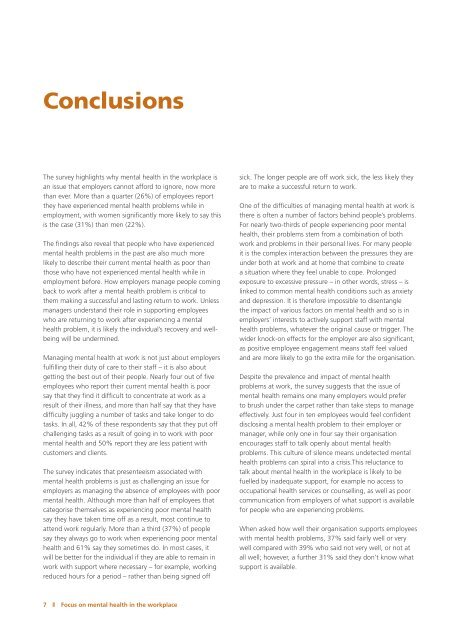Employee Outlook: Focus on mental health in the workplace - Mind
Employee Outlook: Focus on mental health in the workplace - Mind
Employee Outlook: Focus on mental health in the workplace - Mind
- No tags were found...
You also want an ePaper? Increase the reach of your titles
YUMPU automatically turns print PDFs into web optimized ePapers that Google loves.
C<strong>on</strong>clusi<strong>on</strong>sThe survey highlights why <strong>mental</strong> <strong>health</strong> <strong>in</strong> <strong>the</strong> <strong>workplace</strong> isan issue that employers cannot afford to ignore, now morethan ever. More than a quarter (26%) of employees report<strong>the</strong>y have experienced <strong>mental</strong> <strong>health</strong> problems while <strong>in</strong>employment, with women significantly more likely to say thisis <strong>the</strong> case (31%) than men (22%).The f<strong>in</strong>d<strong>in</strong>gs also reveal that people who have experienced<strong>mental</strong> <strong>health</strong> problems <strong>in</strong> <strong>the</strong> past are also much morelikely to describe <strong>the</strong>ir current <strong>mental</strong> <strong>health</strong> as poor thanthose who have not experienced <strong>mental</strong> <strong>health</strong> while <strong>in</strong>employment before. How employers manage people com<strong>in</strong>gback to work after a <strong>mental</strong> <strong>health</strong> problem is critical to<strong>the</strong>m mak<strong>in</strong>g a successful and last<strong>in</strong>g return to work. Unlessmanagers understand <strong>the</strong>ir role <strong>in</strong> support<strong>in</strong>g employeeswho are return<strong>in</strong>g to work after experienc<strong>in</strong>g a <strong>mental</strong><strong>health</strong> problem, it is likely <strong>the</strong> <strong>in</strong>dividual’s recovery and wellbe<strong>in</strong>gwill be underm<strong>in</strong>ed.Manag<strong>in</strong>g <strong>mental</strong> <strong>health</strong> at work is not just about employersfulfill<strong>in</strong>g <strong>the</strong>ir duty of care to <strong>the</strong>ir staff – it is also aboutgett<strong>in</strong>g <strong>the</strong> best out of <strong>the</strong>ir people. Nearly four out of fiveemployees who report <strong>the</strong>ir current <strong>mental</strong> <strong>health</strong> is poorsay that <strong>the</strong>y f<strong>in</strong>d it difficult to c<strong>on</strong>centrate at work as aresult of <strong>the</strong>ir illness, and more than half say that <strong>the</strong>y havedifficulty juggl<strong>in</strong>g a number of tasks and take l<strong>on</strong>ger to dotasks. In all, 42% of <strong>the</strong>se resp<strong>on</strong>dents say that <strong>the</strong>y put offchalleng<strong>in</strong>g tasks as a result of go<strong>in</strong>g <strong>in</strong> to work with poor<strong>mental</strong> <strong>health</strong> and 50% report <strong>the</strong>y are less patient withcustomers and clients.The survey <strong>in</strong>dicates that presenteeism associated with<strong>mental</strong> <strong>health</strong> problems is just as challeng<strong>in</strong>g an issue foremployers as manag<strong>in</strong>g <strong>the</strong> absence of employees with poor<strong>mental</strong> <strong>health</strong>. Although more than half of employees thatcategorise <strong>the</strong>mselves as experienc<strong>in</strong>g poor <strong>mental</strong> <strong>health</strong>say <strong>the</strong>y have taken time off as a result, most c<strong>on</strong>t<strong>in</strong>ue toattend work regularly. More than a third (37%) of peoplesay <strong>the</strong>y always go to work when experienc<strong>in</strong>g poor <strong>mental</strong><strong>health</strong> and 61% say <strong>the</strong>y sometimes do. In most cases, itwill be better for <strong>the</strong> <strong>in</strong>dividual if <strong>the</strong>y are able to rema<strong>in</strong> <strong>in</strong>work with support where necessary – for example, work<strong>in</strong>greduced hours for a period – ra<strong>the</strong>r than be<strong>in</strong>g signed offsick. The l<strong>on</strong>ger people are off work sick, <strong>the</strong> less likely <strong>the</strong>yare to make a successful return to work.One of <strong>the</strong> difficulties of manag<strong>in</strong>g <strong>mental</strong> <strong>health</strong> at work is<strong>the</strong>re is often a number of factors beh<strong>in</strong>d people’s problems.For nearly two-thirds of people experienc<strong>in</strong>g poor <strong>mental</strong><strong>health</strong>, <strong>the</strong>ir problems stem from a comb<strong>in</strong>ati<strong>on</strong> of bothwork and problems <strong>in</strong> <strong>the</strong>ir pers<strong>on</strong>al lives. For many peopleit is <strong>the</strong> complex <strong>in</strong>teracti<strong>on</strong> between <strong>the</strong> pressures <strong>the</strong>y areunder both at work and at home that comb<strong>in</strong>e to createa situati<strong>on</strong> where <strong>the</strong>y feel unable to cope. Prol<strong>on</strong>gedexposure to excessive pressure – <strong>in</strong> o<strong>the</strong>r words, stress – isl<strong>in</strong>ked to comm<strong>on</strong> <strong>mental</strong> <strong>health</strong> c<strong>on</strong>diti<strong>on</strong>s such as anxietyand depressi<strong>on</strong>. It is <strong>the</strong>refore impossible to disentangle<strong>the</strong> impact of various factors <strong>on</strong> <strong>mental</strong> <strong>health</strong> and so is <strong>in</strong>employers’ <strong>in</strong>terests to actively support staff with <strong>mental</strong><strong>health</strong> problems, whatever <strong>the</strong> orig<strong>in</strong>al cause or trigger. Thewider knock-<strong>on</strong> effects for <strong>the</strong> employer are also significant,as positive employee engagement means staff feel valuedand are more likely to go <strong>the</strong> extra mile for <strong>the</strong> organisati<strong>on</strong>.Despite <strong>the</strong> prevalence and impact of <strong>mental</strong> <strong>health</strong>problems at work, <strong>the</strong> survey suggests that <strong>the</strong> issue of<strong>mental</strong> <strong>health</strong> rema<strong>in</strong>s <strong>on</strong>e many employers would preferto brush under <strong>the</strong> carpet ra<strong>the</strong>r than take steps to manageeffectively. Just four <strong>in</strong> ten employees would feel c<strong>on</strong>fidentdisclos<strong>in</strong>g a <strong>mental</strong> <strong>health</strong> problem to <strong>the</strong>ir employer ormanager, while <strong>on</strong>ly <strong>on</strong>e <strong>in</strong> four say <strong>the</strong>ir organisati<strong>on</strong>encourages staff to talk openly about <strong>mental</strong> <strong>health</strong>problems. This culture of silence means undetected <strong>mental</strong><strong>health</strong> problems can spiral <strong>in</strong>to a crisis.This reluctance totalk about <strong>mental</strong> <strong>health</strong> <strong>in</strong> <strong>the</strong> <strong>workplace</strong> is likely to befuelled by <strong>in</strong>adequate support, for example no access tooccupati<strong>on</strong>al <strong>health</strong> services or counsell<strong>in</strong>g, as well as poorcommunicati<strong>on</strong> from employers of what support is availablefor people who are experienc<strong>in</strong>g problems.When asked how well <strong>the</strong>ir organisati<strong>on</strong> supports employeeswith <strong>mental</strong> <strong>health</strong> problems, 37% said fairly well or verywell compared with 39% who said not very well, or not atall well; however, a fur<strong>the</strong>r 31% said <strong>the</strong>y d<strong>on</strong>’t know whatsupport is available.7 <str<strong>on</strong>g>Focus</str<strong>on</strong>g> <strong>on</strong> <strong>mental</strong> <strong>health</strong> <strong>in</strong> <strong>the</strong> <strong>workplace</strong>
















